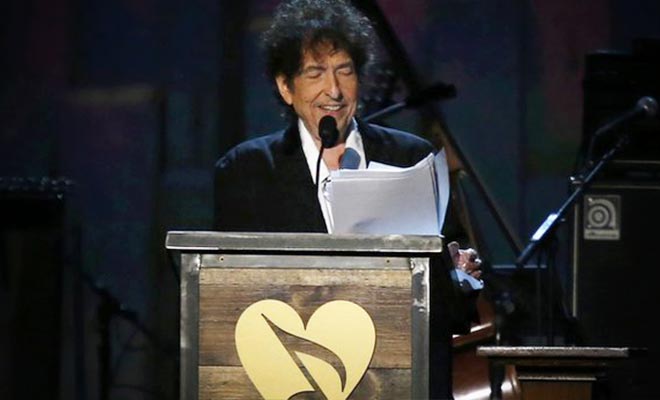 Courtesy of Reuters
Courtesy of Reuters
Featured
Bob Dylan – Never Plays a Note and Confounds Expectations… Again!!!
Digital Bucket says:
On Friday Night February 6, 2015, Bob Dylan walked on stage, to accept the MusiCares Person of the Year award, in Los Angeles. As Dylan was being introduced by Jimmy Carter, the 90 year-old former President, most in attendance expected him to do the usual. Hold up the award, offer a thank-you, quickly wave, and take a fast exit stage right. Not a bad guess, that’s how most of these award ceremonies usually go. So why would anyone expect anything different from the usually elusive Dylan? Then Dylan walked up to the podium and jaws dropped, as he proceeded to read carefully from a prepared speech, that went on for almost 40 minutes. He had the audience flabbergasted, spellbound as he confounded expectations. Read a transcript from LA Times here
Bob Lefsetz of “The Lefsetz Letter”, a well respected and heavily circulated music industry blogger, who was in attendance, offered this up..
[Excerpt]
“What kind of crazy f-d up world do we live in where Bob Dylan comes back from the dead and delivers the paramount rock and roll experience of the twenty first century?”……
“Bob didn’t play a note, but he delivered a speech that dropped jaws and had you tingling, not believing you were there in attendance.”
“Last night I experienced the best speech by a rock musician ever.”
The MusiCares audience anticipated the Dylan as usual, much the same way as the audience at that now legendary concert at The Newport Folk Festival in 1965, thought they also knew what to expect.
The Newport audience in 1965, imagined Dylan the folk singer, a poet who was being hailed as the voice of a generation, but instead Dylan “plugged in” and backed by Al Kooper and Mike Bloomfield of the Butterfield Blues Band, electrified a generation and changed the recording industry forever.
Part of the audience booed and part were transformed, but that night 1965 Bob Dylan started doing the unexpected, by confounding expectations.
The 1965 Newport performance went onto become the subject of books, documentaries and a few tall tales. In the 2007 documentary, The Other Side of the Mirror: Bob Dylan Live at the Newport Folk Festival 1963–1965. Mojo magazine interviewed the director, Murray Lerner asking:
“There’s been a lot of debate over the years as to who exactly was doing the booing and who were they booing? Dylan? The organizers? The shortness of the set?” Lerner replied: “It’s a good question.”
Here is a link to the electric songs from that night in 1965
Has any other individual, whether it be Poet, Pope or President – let alone an entertainer of any stature, sans possibly John Lennon, ever been asked so many questions?, Who are you?, What are you?, What do you do?, How do you do it?, Why did you do that?, What does it mean?, and When will you stop?
This excerpt from a 1965 Press conference held in the San Francisco studios of KQED set the stage for the next fifty years of relentless inquiry.
After being introduced as one of America’s leading poets by Ralph J. Gleason, The Chronicle columnist,
Dylan was asked how he would describe himself ?
BD : “What can I say?” , “A song-and-dance man, how’s that?”
And what was his purpose in life?
BD : “To stay as long as I can.”
“Oh I do like to carry cards…?
BD : “uh…the jack of diamonds and, well, the ace of spades. I’d like to picket with them in front of the post office. Oh, and I’d have some words on the signs–words like CAMERA and MICROPHONE and MICE…”
Asked to define his philosophy
BD : “I don’t think anything planned ever turns out the way you want it–not that this means anything.”
Then asked why did he write poetry? Why did he sing?
BD : “I have nothing else to do.”
Then, wondering out loud about the possible reasons for his phenomenal success, he added,
BD : “I have no idea. I haven’t really struggled for success. It just happened.”
The questioning goes on and on, now for almost 50 years.
There have been many more press conferences since KQED in 1965, countless magazine articles, including a recent one in AARP (yep Dylan is over 70), many television news programs, books, and blogs and even people just showing up on his door step.
Lets take a look at how he answered in this Q&A from veteran journalist Ed Bradley interviewing Dylan for CBS 60 Minutes in 2004
[Excerpt]
EB: So the people would actually come to the house?
BD: Mm-hmm.
EB: And do what?
BD: They wanted discuss things with me, politics and philosophy and organic farming and things, you know.
The Bradley 60 minutes interview continues: [Excerpt]
EB: What was the image that people had of you? And what was the reality?
BD: The image of me was certainly not a songwriter or a singer. It was more like some kind of a threat to society in some kind of way.
EB: What was the toughest part for you personally?
BD: It was like being in an Edgar Allan Poe story.
And you’re just not that person everybody thinks you are, though they call you that all the time. ‘You’re the prophet.’ ‘You’re the savior.’ I never wanted to be a prophet or savior. Elvis maybe. I could easily see myself becoming him. But prophet? No.
EB: So you didn’t see yourself as Robert Zimmerman.
BD: For some reason, you know, I never did.
EB: Even before you started performing?
BD: Nah, even then. Some people get born, you know, with the wrong names, wrong parents. I mean, that happens.
EB: Tell me how you decided on Bob Dylan?
BD: You call yourself what you want to call yourself. This is the land of the free…..
EB: Do you ever look back at the music that you’ve written and look back at it and say “Wow! That surprised me!”?
BD: I used to. I don’t do that anymore. I don’t know how I got to write those songs.
EB: What do you mean you don’t know how?
BD: All those early songs were almost magically written.
Ah… “Darkness at the break of noon, shadows even the silver spoon, a handmade blade, the child’s balloon…”
BD: Well, try to sit down and write something like that. There’s a magic to that, and it’s not Siegfried and Roy kind of magic, you know? It’s a different kind of a penetrating magic. And, you know, I did it. I did it at one time.
EB: Do you think you can do it again today?
BD: Uh-no.
EB: Does that disappoint you, or…?
BD: Well, you can’t do something forever. I did it once, and I can do other things now. But, I can’t do that.
EB: Why do you still do it? Why are you still out here?
BD: Well, it goes back to that destiny thing. I made a bargain with it, you know, long time ago. And I’m holding up my end…
EB: What was your bargain?
BD: …to get where I am now.
EB: Should I ask who you made that bargain with?
BD: [laughs] With the chief commander.
EB: On this earth?
BD: [laughs] In this earth and in the world we can’t see.
The 60 Minutes and KQED interviews are a telling example of how Dylan has approached most of his previous Q&A sessions. He has been elusive, doggy, as if he was making up a legend, or better yet writing himself into one of his songs. Then that all changed on Saturday with his speech at the MusiCares awards. He opened up, peeled back the curtain, and for almost forty minutes went deeper than ever before, on many of the subjects he has tap danced around for years. He talked straight and in was intelligent and intelligible.
Link to the full transcript of his speech from Randall Roberts of the LA Times
During a section of the speech, that follows. Dylan opens up, digging deep into the roots and inspiration of some of his most famous songs. Like “Blowin in the Wind “, “Highway 61″, “Maggie’s Farm”, and “Tom Thumbs Blues”. Songs that he once told Ed Bradley, during the 60 Minutes interview were magical, were now really just extensions of a long chord, dating back to work songs and American folk standards.
Dylan Reading… [Excerpt]
“These songs didn’t come out of thin air. I didn’t just make them up out of whole cloth. Contrary to what Lou Levy said, there was a precedent. It all came out of traditional music: traditional folk music, traditional rock ‘n’ roll and traditional big-band swing orchestra music.
I learned lyrics and how to write them from listening to folk songs. And I played them, and I met other people that played them back when nobody was doing it. Sang nothing but these folk songs, and they gave me the code for everything that’s fair game, that everything belongs to everyone.
For three or four years all I listened to were folk standards. I went to sleep singing folk songs. I sang them everywhere, clubs, parties, bars, coffeehouses, fields, festivals. And I met other singers along the way who did the same thing and we just learned songs from each other. I could learn one song and sing it next in an hour if I’d heard it just once.
Reading from his speech he recites the words to this railroad work song, that was sung as the railroad spikes were driven into the ground. Then Dylan goes on to recite the words to one of his most famous songs. Dylan did this a number of times, as to almost over prove the point, saying I just did what they did, it wasn’t so special.
If you sang “John Henry” as many times as me” —
“John Henry was a steel-driving man / Died with a hammer in his hand / John Henry said a man ain’t nothin’ but a man / Before I let that steam drill drive me down / I’ll die with that hammer in my hand.”
“John Henry” by Arthur Bell at Cummins State Farm in Gould, Arkansas on May 20, 1939
“If you had sung that song as many times as I did, you’d have written”
“How many roads must a man walk down? too.” {“Blowin in the Wind” by Bob Dylan}
Big Bill Broonzy had a song called “Key to the Highway.”
“I’ve got a key to the highway / I’m booked and I’m bound to go / Gonna leave here runnin’ because walking is most too slow.”
“I sang that a lot. If you sing that a lot, you just might write”
“Georgia Sam he had a bloody nose / Welfare Department they wouldn’t give him no clothes / He asked poor Howard where can I go / Howard said there’s only one place I know / Sam said tell me quick man I got to run / Howard just pointed with his gun / And said that way down on Highway 61.” - {“Highway 61″ by Bob Dylan}
“You’d have written that too if you’d sang “Key to the Highway” as much as me.”
“Ain’t no use sit ‘n cry / You’ll be an angel by and by / Sail away, ladies, sail away / I’m sailing away my own true love.”
“Roll the cotton down, aw, yeah, roll the cotton down / Ten dollars a day is a white man’s pay / A dollar a day is the black man’s pay / Roll the cotton down.”
“If you sang that song as many times as me, you’d be writing”
“I ain’t gonna work on Maggie’s farm no more,” too.
“I sang a lot of “come all you” songs. There’s plenty of them. There’s way too many to be counted.”
“Come along boys and listen to my tale / Tell you of my trouble on the old Chisholm Trail.” Or,
“Come all ye good people, listen while I tell / the fate of Floyd Collins a lad we all know well / The fate of Floyd Collins, a lad we all know well.” …..
Dylan continues reading… [Excerpt]
“Come all ye fair and tender ladies / Take warning how you court your men / They’re like a star on a summer morning / They first appear and then they’re gone again.” “If you’ll gather ’round, people / A story I will tell / ‘Bout Pretty Boy Floyd, an outlaw / Oklahoma knew him well.” {Woody Guthrie – 1940}
Here is a recording of American folk icon Woody Guthrie singing Ballad of Pretty Boy Floyd. Guthrie’s influence on Dylan is long documented but now we hear how much directly from Dylan.
“If you sung all these “come all ye” songs all the time, you’d be writing”
“Come gather ’round people where ever you roam, admit that the waters around you have grown / Accept that soon you’ll be drenched to the bone / If your time to you is worth saving / And you better start swimming or you’ll sink like a stone / The times they are a-changing.” - {“Times They Are a-Changin'” by Bob Dylan}
“You’d have written them too. There’s nothing secret about it. You just do it subliminally and unconsciously, because that’s all enough, and that’s all I sang. That was all that was dear to me. They were the only kinds of songs that made sense.”
“When you go down to Deep Ellum keep your money in your socks / Women in Deep Ellum put you on the rocks.”
Here is a 1935 recording of Deep Ellum Blues by The Shelton Brothers
Dylan Continues…
“Sing that song for a while and you just might come up with”
“When you’re lost in the rain in Juarez and it’s Easter time too / And your gravity fails and negativity don’t pull you through / Don’t put on any airs / When you’re down on Rue Morgue Avenue / They got some hungry women there / And they really make a mess outta you.” {Just Like Tom Thumbs Blues}
“All these songs are connected. Don’t be fooled. I just opened up a different door in a different kind of way. It’s just different, saying the same thing. I didn’t think it was anything out of the ordinary. …
Well you know, I just thought I was doing something natural, but right from the start, my songs were divisive for some reason. They divided people. I never knew why. Some got angered, others loved them. Didn’t know why my songs had detractors and supporters. A strange environment to have to throw your songs into, but I did it anyway.
Last thing I thought of was who cared about what song I was writing. I was just writing them. I didn’t think I was doing anything different. I thought I was just extending the line. Maybe a little bit unruly, but I was just elaborating on situations. Maybe hard to pin down, but so what? A lot of people are hard to pin down. You’ve just got to bear it.
Critics have made a career out of accusing me of having a career of confounding expectations. Really? Because that’s all I do. That’s how I think about it. Confounding expectations.
“What do you do for a living, man?”
“Oh, I confound expectations.”
You’re going to get a job, the man says, “What do you do?” “Oh, confound expectations.: And the man says, “Well, we already have that spot filled. Call us back. Or don’t call us, we’ll call you.” Confounding expectations. What does that mean? ‘Why me, Lord? I’d confound them, but I don’t know how to do it.’ “
But Dylan didn’t stop pealing back the curtain there. He took great care to say, that all of his success was due in large part, by support from people who believed in him very early on. He thanked the people who helped him, the people he respects, at times throwing barbs at those he didn’t much care for, or respect.
Dylan Continues …
“I should mention a few people along the way who brought this about. I know I should mention John Hammond, great talent scout for Columbia Records. He signed me to that label when I was nobody. It took a lot of faith to do that, and he took a lot of ridicule, but he was his own man and he was courageous. And for that, I’m eternally grateful….
Trends did not interest John, and I was very noncommercial but he stayed with me. He believed in my talent and that’s all that mattered. I can’t thank him enough for that.
Artie Mogull at Witmark Music signed me next to his company, and he told me to just keep writing songs no matter what, that I might be on to something. Well, he too stood behind me, and he could never wait to see what I’d give him next. I didn’t even think of myself as a songwriter before then. I’ll always be grateful for him also for that attitude. …..
I also have to mention some of the early artists who recorded my songs very, very early, without having to be asked. Just something they felt about them that was right for them. I’ve got to say thank you to Peter, Paul and Mary, who I knew all separately before they ever became a group. …..
They took a song of mine that had been recorded before that was buried on one of my records and turned it into a hit song. Not the way I would have done it — they straightened it out.
But since then hundreds of people have recorded it and I don’t think that would have happened if it wasn’t for them. They definitely started something for me.
The Byrds, the Turtles, Sonny & Cher — they made some of my songs Top 10 hits but I wasn’t a pop songwriter and I really didn’t want to be that, but it was good that it happened. Their versions of songs were like commercials, but I didn’t really mind that because 50 years later my songs were being used in the commercials. So that was good too. I was glad it happened, and I was glad they’d done it. “
“Oh, and can’t forget Jimi Hendrix. I actually saw Jimi Hendrix perform when he was in a band called Jimmy James and the Blue Flames — something like that. And Jimi didn’t even sing. He was just the guitar player. He took some small songs of mine that nobody paid any attention to and pumped them up into the outer limits of the stratosphere and turned them all into classics. I have to thank Jimi, too. I wish he was here.” ….
When he thanked MusicCare for what it had done for a musician friend, who fell on hard times. It was as straight and direct as he has ever been. Dylan was being very human, it was not an act, he was speaking from the heart.
“I’m proud to be here tonight for MusiCares. I think a lot of this organization. They’ve helped many people. Many musicians who have contributed a lot to our culture. I’d like to personally thank them for what they did for a friend of mine, Billy Lee Riley. A friend of mine who they helped for six years when he was down and couldn’t work. Billy was a son of rock ‘n’ roll, obviously”……
“And I ain’t lying when I tell you that MusiCares paid for my friend’s doctor bills, and helped him to get spending money. They were able to at least make his life comfortable, tolerable to the end. That is something that can’t be repaid. Any organization that would do that would have to have my blessing.”
And then he wrapped it all up saying:
“I’m going to get out of here now. I’m going to put an egg in my shoe and beat it. I probably left out a lot of people and said too much about some. But that’s OK. Like the spiritual song, ‘I’m still just crossing over Jordan too.’ Let’s hope we meet again. Sometime. And we will, if, like Hank Williams said, “the good Lord willing and the creek don’t rise.”
So now we ask the question Why?, Why now?, Why the candor?, and Why the honesty?
Perhaps because there was no interviewer, no silly questions or perhaps because all along, he was following this famous quote from Oliver Goldsmith, “Ask me no questions, and I’ll tell you no lies.”
Or was it as he said in the speech?;
“What do you do for a living, man?”
“Oh, I confound expectations.”
Whatever the reason, the result is fascinating, insightful and sobering. All from the man who has spent the last fifty plus years, as just “A song-and-dance man.”
The full transcript of his speech available from the LA Times

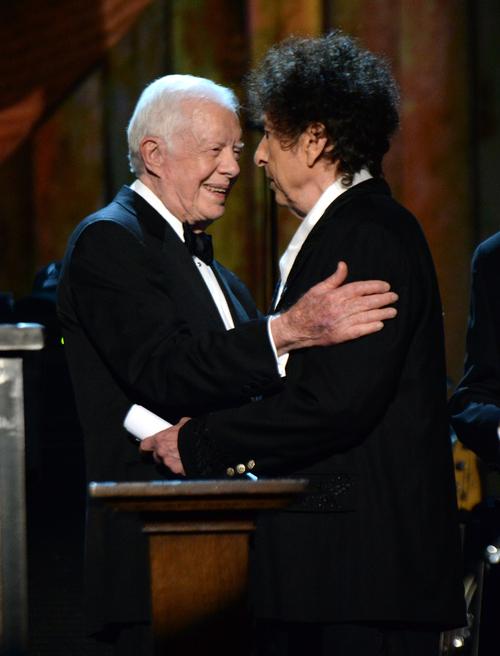
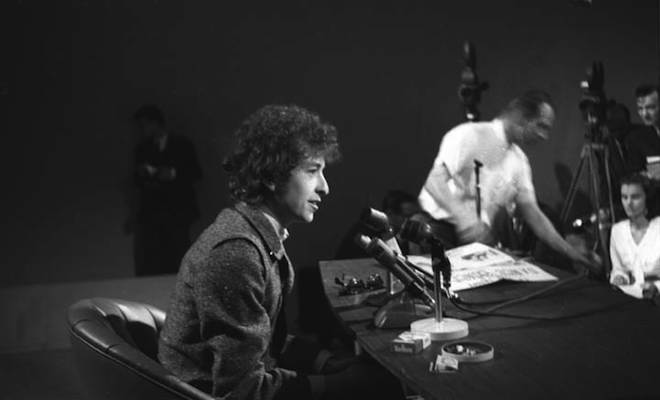

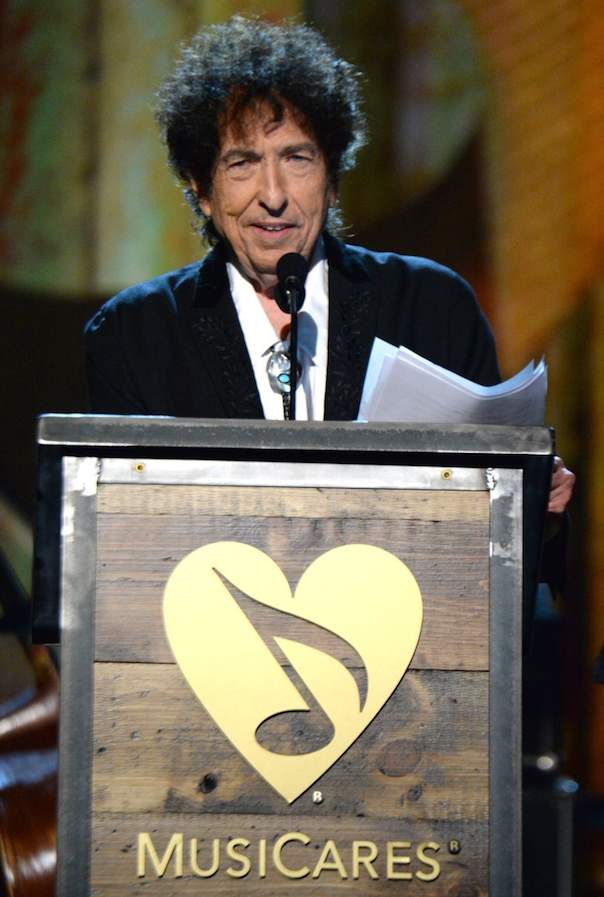
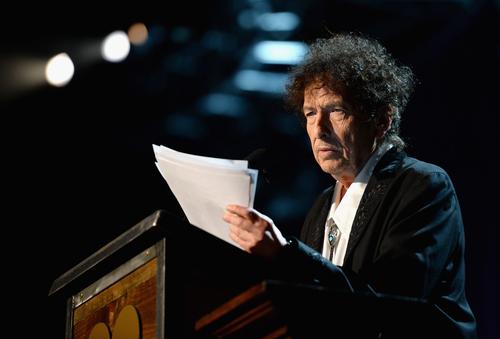
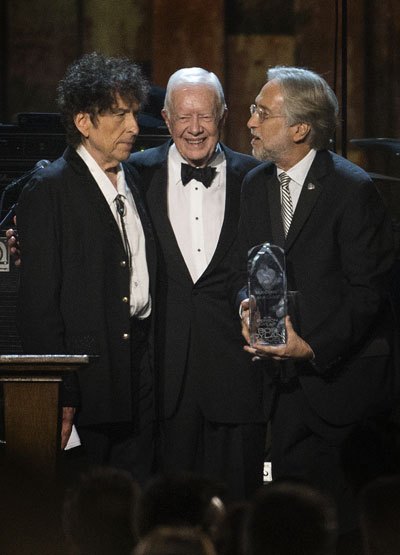
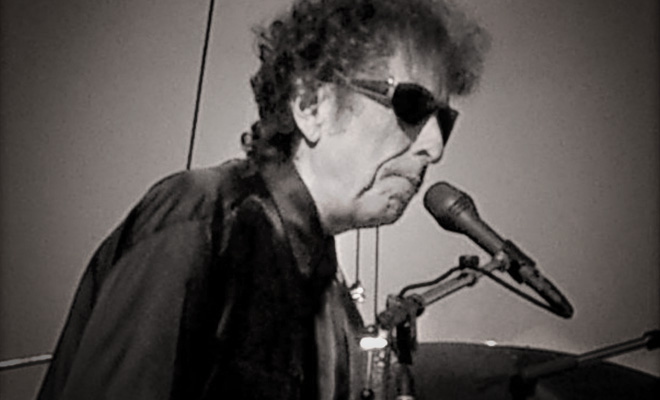

Recent Comments